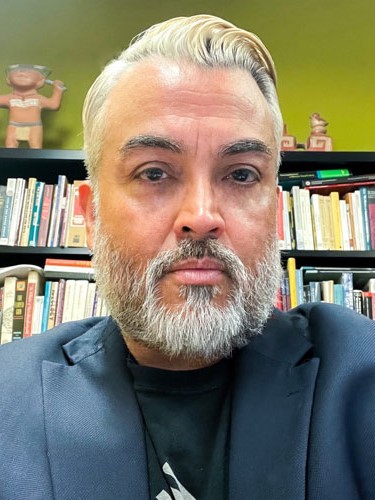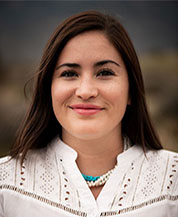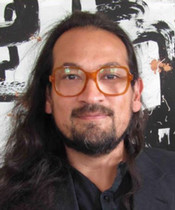Faculty Mentors
 Andrea Mays
Andrea Mays
Dr. Mays, is a Senior Lecturer in the Department of Africana Studies at the University of New Mexico. She has taught courses in the UNM Department of American Studies and the Women, Gender & Sexuality Studies Program. Her teaching and scholarship focus on African American and Black Atlantic Culture and Politics, Visual Culture Studies, and Black Feminist Studies. Her research interests include Black Atlantic expressions of critical and resistance politics in visual and literary culture. She teaches courses on Black Art, Black Feminism, Film, Literature, Afrofuturism, and the fiction of Octavia Butler. Dr. Mays’ public scholarship includes essays and articles published in USA Today, The Albuquerque Journal, The Santa Fe Reporter, IKON Feminism Commemorative Digital Archive, Morgan State University Global Journalism Review, and the film Letters to Our Daughters directed by native New Mexican filmmaker Christopher Roybal, narrated by Dolores Huerta, Co-Founder and First Vice President Emeritus of the United Farm Workers of America, AFL-CIO.
 Bernadine Hernández
Bernadine Hernández
Dr. Bernadine Hernández is an associate professor in the Department of English at the University of New Mexico. She specializes in transnational feminism and sexual economies of the US-Mexico borderlands, along with American Literary Studies and Empire, border and migration history, and Chicana/Latina Literature and Sexualities. Her book with UNC press is titled Border Bodies: Racialized Sexuality, Sexual Capital, and Violence in the Nineteenth Century Borderlands and is the first book length study that focuses on sexual capital and gender and sexual violence in the borderlands in the nineteenth and early twentieth-centuries through recovered archival work. She is also the co-editor of the first edited collection on Ana Castillo titled New Transnational Chicanx Perspectives on Ana Castillo, published with University of Pittsburg Press in Spring 2021.
 Ray Hernandez Duran
Ray Hernandez Duran
Dr. Ray Hernandez Duran is currently Professor of Spanish Colonial Art and Architecture in the Department of Art at UNM and is affiliated with Latin American Studies, Chicana/Chicano Studies, Africana Studies, and Museum Studies. He received his Doctorate in Pre-Hispanic and Colonial Latin American Art at The University of Chicago. And completed his M.A. in the Art of Africa and the African Diaspora at the University of Wisconsin-Madison. His research centers on a critical exploration of historiography, colonialism, institutional histories and practices, and the political nature of knowledge production.
 David Weiss
David Weiss
Dr. David Weiss teaches courses in strategic communication, political communication, and media studies. His research interests include media discourse, political and religious communication, and the media and popular culture industries. Before his return to academia in 2000, Dr. Weiss worked in the advertising agency business in New York City for almost two decades. He has taught in Oregon, Ohio, and Montana, and is thrilled to be back at UNM, where he earned his Ph.D. degree in 2005. His work manifested in two distinct research and publication streams: (1) political communication and, in particular, its intersection with religious communication; and (2) linguistic manifestations of identity in media and popular culture. He is in the early stages of a project situated at the intersection of media theory (specifically, normative theories of journalism) and the political economy of media.
 Myrriah Gómez
Myrriah Gómez
Dr. Myrriah Gómez, an Associate Professor at the Honors College, is from the Pojoaque Valley in northern New Mexico. She earned her Doctorate in English with an emphasis in Latina/o Studies from the University of Texas at San Antonio and is a 2011 Ford Foundation Predoctoral Fellow. She is Research Faculty at the Southwest Hispanic Research Institute (SHRI) and Affiliated Faculty in the Department of American Studies at UNM. Her monograph, Nuclear Nuevo México: Colonialism and the Effects of the Nuclear Industrial Complex on Nuevomexicanos, examines the effects of settler colonialism and the nuclear industrial complex in New Mexico. Her second book project is an analysis of literature pertaining to nuclear culture written by people of color.
 Michael Lechuga
Michael Lechuga
Dr. Michael Lechuga researches and teaches Latina/o/x Studies Communication Studies, Rhetoric, Migration and Settler Colonialism Studies, and Affect Studies. He graduated with an M.A. in Communication Studies from the University of Texas at El Paso in 2007 and with a Ph.D. in Communication Studies from the University of Denver in 2016. His research explores the ways migrants and migrant communities are subjected in the US by austere migration control structures and white nationalist ideologies. His current research focuses on the role that technology plays in border security assemblages and the ways alienhood is mapped onto migrant bodies through contemporary mechanisms of white-settler governance.
 Francisco Galarte
Francisco Galarte
Dr. Francisco Galarte is an Associate Professor of American Studies and Women, Gender and Sexuality Studies at the University of New Mexico where he teaches courses in Chicanx, Latinx and transgender studies. He was born and raised in Brawley, California located in the Imperial Valley along the US/Mexico Border and identifies strongly as a transfronterizo, meaning that the borderlands inform his creative and scholarly projects. His most recent articles have appeared in publications including Aztlan: Journal of Chicano Studies, Chicana/Latina Studies Journal and TSQ: Transgender Studies Quarterly. He holds a PhD in Educational Policy Studies with a minor in Latina and Latino Studies from the University of Illinois, Urbana Champaign.
 Catherine Rhodes
Catherine Rhodes
Dr. Catherine Rhodes is an Assistant Professor in the Department of Anthropology focusing in Sociocultural and LInguistic Anthropology. She is an affiliated faculty in the Latin American and Iberian Institute and Educational Linguistics at the University of New Mexico. Dr. Rhodes holds a joint PhD in Anthropology and Education, and a Graduate Certificate in Latin American and Latino Studies from the University of Pennsylvania. She conducts ethnographic research on the relationship between the production of scientific knowledge and models of personhood (including ethnic and social identification) and the role language plays in these processes in Yucatan, Mexico. Her work focuses on issues of cultural congruency and accessibility in non-formal learning settings.
 Sarah Davis-Secord
Sarah Davis-Secord
Dr. Sarah Davis-Secord is an Associate Professor in the History department as well as the Director of the Women, Gender, and Sexuality Studies program. She offers a range of undergraduate and graduate courses on the Middle Ages, particularly of the Mediterranean region, medieval minorities, travel and travelers, and Muslim-Christian interactions. Her research focuses on early and central Middle Ages, particularly interested in intercultural and interreligious relationships within the Mediterranean Sea region. My book, Where Three Worlds Met: Sicily in the Early Medieval Mediterranean (Cornell University Press, 2017) explores the intercultural relationships between Greek Christians, Muslims, and Latin Christians in the central Mediterranean through analysis of communications and travel that occurred to and from the island of Sicily.
